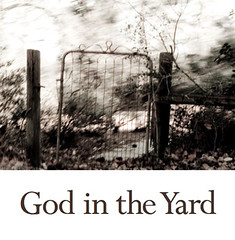I believe in telling the truth, and the truth is that I'm no good at celebrating, at least under the traditional definition of the word. No good at all, in fact. If you need a realist, I'm your woman, but celebrating comes like pulling teeth.
That's why writing about week 4 in L. L. Barkat's
God in the Yard feels like such a monumental task to me. I don't have much to say about celebrating, because it's not something that's a habit in my life. Thinking about it feels a little like trying to visualize a tesseract - I can almost see it, and then everything dissolves again.
There's one time in my life when I remember celebrating well, and that time it felt like a command straight from God. The situation was crazy: Dave and I needed money to get married, he'd been promised a job, and it feel through. We either needed to postpone the wedding or get some cash.
I prayed like I'd never prayed before, with faith I didn't know I'd had and words I would never have said if they weren't given to me: God, there's plenty of money out there. Help some of it to find its way to us.
It did - a friend wrote Dave a $1000 check out of the blue, because God told her he needed it. Then he got a job out of nowhere, and I felt commanded to celebrate.
It rose up inside of me with an imperative tang. I needed to do it and we did: I took Dave out for one of the nicest dinners of our stint as a dating couple, where we feasted and drank and built an altar of remembrance for what God had done there.
And I do remember it, vividly. In fact, if that story teaches me nothing else, it's that celebrating is important because it helps us remember the things God does, the things He once did, even in a season where it's hard to hear his voice.
I want to remember, and so I need to celebrate.
Now I struggle with my normal days. I find it hard to want a normal life, to want this home-and-family existence that doesn't involve running around doing fun, exciting things all the time.
And I wonder if I struggle with them because I don't know how to celebrate them. If I knew how to mark the little things, the baby's developmental milestones, the way the light comes through the windows in the morning, the things Dave and I do to love each other on a daily basis, maybe I would appreciate them more.
Celebrations are hard for me because childhood celebrations came with expectations. When I was a child, celebration days were supposed to be perfect. People wanted to have fun, to get along, to be happy spending time together as a family.
Since perfect days are rare, expectations were almost always disappointed. In fact, I did most of the disappointing. I put so much pressure on myself that I would snap and get upset. I'd yell at my brother, cry when something didn't work out the way we'd planned, or get upset with someone else who didn't meet my expectations.
I came to believe that I ruined good things, good celebrations, and so in some ways I came to dread them.
I want celebrating to be something different for my children. I want it to be something they love, but I want it to be human, real and messy, like everything having to do with people is messy.
As luck would have it, Barkat expands the definition of "celebration" in her book, from something that not only marks a happy time or an act of God to something that notes or highlights things of importance, even when those are hard things. This makes celebration into something I'm more familiar with.
Most of my celebrations are little things: daily writing, a prayer that I pray almost every morning that reminds me of God's presence, Dave's and my ritual before bed of recounting the best and worst moments of every day. They don't have much in common except that they're regular, they're important for me, and they usher me into the presence of God.
They're not enough. I want more celebrating, more marking and noting and deliberate focusing in my life right now. But I suppose where I am is a place to start, since being with God is never a bad thing.
(I finally found the button!)









